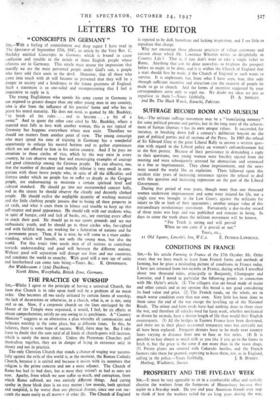THE PRACTICE OF WORSHIP
Sta—Whilst I agree to the principle of having a universal Church, the form that Church is to take upon itself will be a problem of no mean order. One becomes all too easily irritated by certain forms of worship, the lack of decorations or otherwise, in a church, what is, or is not, sung and so on. Now, if a corporate church on the lines envisaged by the Master of the Temple were organised, it would, I feel, by its efforts to obtain comprehension, satisfy no one owing to its patchiness. A " Country Minister" suggests as an alternative a plan whereby all communities and believers worship in the same place, but at different times. In this, he believes, there is some hope of success. Well, there may be. But I take leave to doubt that the sum total of all kinds of church-goers will increase, which is surely the main object. Unless the Protestant Churches pull themselves together, they are in danger of being in existence only in theory and not in practice.
The only Christian Church that stands a chance of waging war success- fully against the evils of this world is, at the moment, the Roman Catholic Church, because it is united and because it insists with its members that religion is the prime concern and not a mere adjunct. The Church of Rome has had its bad days, but at most they weren't as bad as ours are now. Apathy, from which we now suffer so much, and corruption, from which Rome suffered, are two entirely different things. And curing apathy in these bleak days is no easy matter ; low morale, both spiritual and ten oral, is far worse than any physical disease, since one can suc- cumb the more easily to all mann,T of other ills. The Church of England
is reputed to be dull, humdrum and lacking inspiration, and I see little to repudiate that charge.
Why not encourage those pleasant practices of village ceremony and custom about which Mr. Lawrence Whistler writes so delightfully in Country Life ? That is, if you don't want to take a single ticket to Rome. Anything that can be done nowadays to brighten the prospect before us ought to be done, and it is within the Church of England that a start should first be made, if the Church of England as such wants to survive. It is unpleasant, but, from what I have seen, true, that only through sufficient incentive and attraction can the majority of people be made to go to church. And the forms of incentive suggested by your correspondents serve only to repel me. No doubt my ideas are just as repulsive to them !—Yours faithfully, D. A. SHIRLEY. and Bn. The Black Watch, Karachi, Pakistan.
































 Previous page
Previous page